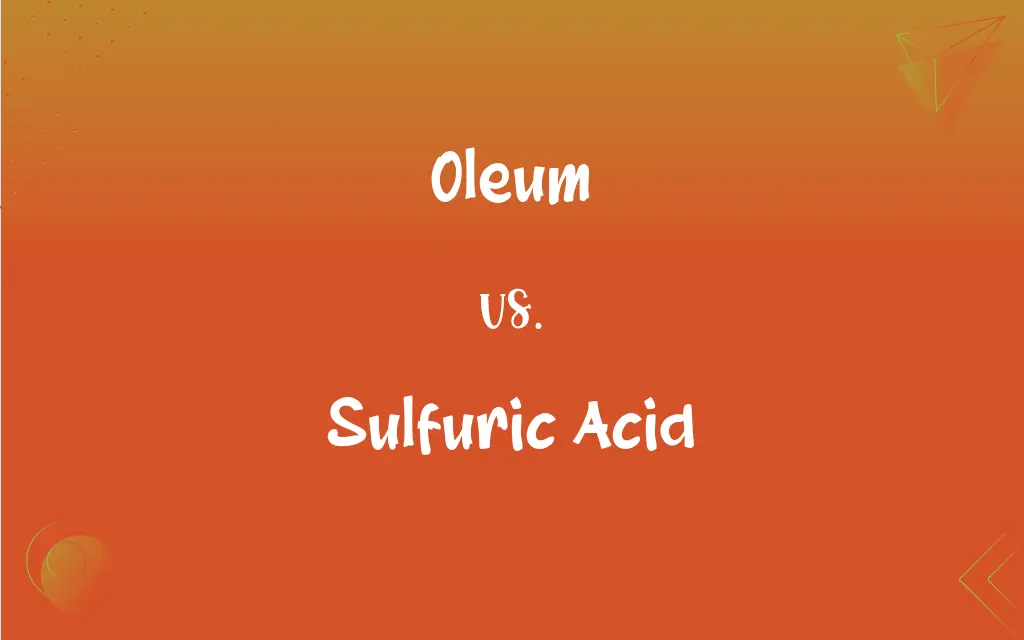Oleum vs. Sulfuric Acid: What's the Difference?
Edited by Aimie Carlson || By Janet White || Published on January 13, 2024
Oleum is sulfuric acid with extra sulfur trioxide (SO₃), making it more reactive; sulfuric acid, H₂SO₄, is a strong, corrosive acid used widely in industry.

Key Differences
Oleum, also known as fuming sulfuric acid, contains additional sulfur trioxide (SO₃) in sulfuric acid. This makes oleum more reactive and potent than sulfuric acid. On the other hand, sulfuric acid is a strong mineral acid, H₂SO₄, known for its wide range of industrial applications, from manufacturing fertilizers to processing petroleum.
In oleum, the concentration of SO₃ can vary. This variation allows for the production of sulfuric acid of different concentrations when diluted with water. Sulfuric acid itself is a stable compound and is commonly used in its pure form.
Oleum is used when a stronger dehydrating agent than sulfuric acid is required. The extra SO₃ in oleum provides it with enhanced dehydrating properties. Sulfuric acid, while also a dehydrating agent, is less potent in this regard.
Safety and handling of oleum and sulfuric acid differ due to their chemical nature. Oleum is more hazardous due to its higher reactivity and requires stricter safety measures. Sulfuric acid, although dangerous, is less volatile.
Both oleum and sulfuric acid are crucial in the chemical industry. Oleum is essential for producing certain chemicals that require a stronger sulfonating agent, whereas sulfuric acid is a key component in various industrial processes.
ADVERTISEMENT
Comparison Chart
Composition
Sulfuric acid with added sulfur trioxide (SO₃)
Pure sulfuric acid, H₂SO₄
Reactivity
More reactive due to extra SO₃
Strong but less reactive than oleum
Use as Dehydrating Agent
Stronger dehydrating properties
Used as a dehydrating agent
Safety
Requires stricter safety measures
Hazardous but less volatile than oleum
Industrial Application
Used in producing chemicals requiring stronger sulfonation
Widely used in manufacturing, processing
ADVERTISEMENT
Oleum and Sulfuric Acid Definitions
Oleum
A highly reactive form of sulfuric acid.
Oleum is preferred for its reactive nature in synthesizing sulfonated compounds.
Sulfuric Acid
A strong, highly corrosive mineral acid, H₂SO₄.
Sulfuric acid is essential in battery manufacturing.
Oleum
Concentrated sulfuric acid containing extra SO₃.
Oleum's concentration was adjusted for the experiment.
Sulfuric Acid
Used widely in industrial chemical processes.
The production of fertilizer involves sulfuric acid.
Oleum
A solution of sulfur trioxide in sulfuric acid.
The laboratory used oleum for specialized chemical reactions.
Sulfuric Acid
Acts as a dehydrating agent.
Sulfuric acid dehydrated the compound in the reaction.
Oleum
More hazardous and corrosive than sulfuric acid.
Handling oleum requires additional safety protocols due to its corrosiveness.
Sulfuric Acid
A common laboratory reagent.
The experiment required the use of sulfuric acid.
Oleum
Used for stronger sulfonation in chemical processes.
To achieve the desired sulfonation, the chemist chose oleum.
Sulfuric Acid
An electrolyte in lead-acid batteries.
The car's battery contains sulfuric acid as an electrolyte.
Oleum
A corrosive fuming solution of sulfur trioxide in sulfuric acid.
Oleum
(inorganic compound) A solution of sulfur trioxide in sulfuric acid.
FAQs
Can oleum be used as a dehydrating agent?
Yes, oleum is a strong dehydrating agent.
What is oleum?
Oleum is sulfuric acid with added sulfur trioxide.
How is oleum different from sulfuric acid?
Oleum contains additional SO₃, making it more reactive.
What precautions are needed when handling oleum?
Strict safety measures due to its high reactivity and corrosiveness.
What is sulfuric acid?
Sulfuric acid is a strong, corrosive mineral acid, H₂SO₄.
Is sulfuric acid used in batteries?
Yes, it's used as an electrolyte in lead-acid batteries.
Can oleum cause more severe burns than sulfuric acid?
Yes, due to its higher concentration and reactivity.
Is sulfuric acid dangerous?
Yes, it's highly corrosive and hazardous.
Can oleum be diluted to make sulfuric acid?
Yes, by adding water to oleum, sulfuric acid of various concentrations can be made.
Is sulfuric acid a common laboratory reagent?
Yes, it's widely used in chemical reactions in labs.
Is sulfuric acid important in environmental processes?
Yes, it plays roles in acid rain and soil acidification.
What industrial uses does sulfuric acid have?
It's used in manufacturing fertilizers, chemicals, and processing petroleum.
Why is oleum preferred in certain chemical syntheses?
Due to its enhanced reactivity and sulfonating properties.
Is oleum used in the production of explosives?
Yes, it's involved in the synthesis of some explosive compounds.
Does sulfuric acid have a role in pharmaceuticals?
Yes, it's used in manufacturing some pharmaceuticals.
How is sulfuric acid produced commercially?
Mostly through the contact process, from sulfur dioxide.
How is oleum stored safely?
In tightly sealed containers made of materials resistant to corrosion.
What is the main hazard of oleum spills?
Its highly reactive nature poses a risk of severe chemical burns.
Does sulfuric acid have a role in cleaning agents?
Yes, it's used in some industrial cleaning agents.
Can sulfuric acid be neutralized?
Yes, typically with a base like sodium hydroxide.
About Author
Written by
Janet WhiteJanet White has been an esteemed writer and blogger for Difference Wiki. Holding a Master's degree in Science and Medical Journalism from the prestigious Boston University, she has consistently demonstrated her expertise and passion for her field. When she's not immersed in her work, Janet relishes her time exercising, delving into a good book, and cherishing moments with friends and family.
Edited by
Aimie CarlsonAimie Carlson, holding a master's degree in English literature, is a fervent English language enthusiast. She lends her writing talents to Difference Wiki, a prominent website that specializes in comparisons, offering readers insightful analyses that both captivate and inform.
































































